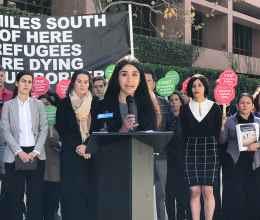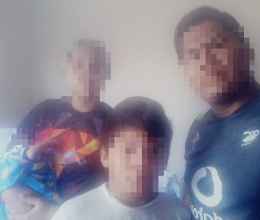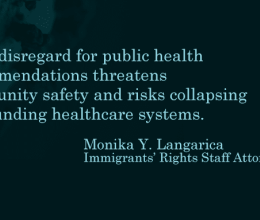FOR IMMEDIATE RELEASE:
April 22, 2019
CONTACT:
Jessica Rofé
jessica.rofe@nyu.edu
212-992-7245
Edward Sifuentes
esifuentes@aclusandiego.org
(619) 501-3408
San Diego, CA: The New York University School of Law’s Immigrant Rights Clinic filed an amicus brief last week on behalf of 42 immigrant rights, community and nonprofit organizations – including the ACLU Foundation of San Diego & Imperial Counties, Al Otro Lado, and The Florence Immigrant & Refugee Rights Project – in a lawsuit challenging the constitutionality of guilty pleas entered in “Operation Streamline” cases throughout the southwest border.
The amicus brief filed in the case, U.S. v Hernandez-Becerra, argues that deplorable pre-hearing conditions coupled with the mechanical en masse plea hearing structure under Operation Streamline violate federal rules of criminal procedure and due process. The case is now before the Ninth Circuit Court of Appeals.
Kara Hartzler, an attorney with the Federal Defenders and the lead attorney in the case, said:
“We welcome amici’s assistance in providing critical information that will allow the Ninth Circuit to better understand how the conditions in Border Patrol stations impact our clients’ ability to make knowing and voluntary pleas.”
Operation Streamline, the U.S. Department of Justice’s fast-track, “zero-tolerance” program, criminally prosecutes immigrants accused of unauthorized border-crossing, in addition to placing them in deportation proceedings. The program, which has been in effect in other states since 2005, was expanded to California in July 2018 under former-Attorney General Jeff Sessions.
Since Streamline’s implementation in California, federal public defenders have objected to the judicial proceedings surrounding the expedited, mass prosecutions. U.S. v Hernandez-Becerra, is challenging the legality of a guilty plea taken by Claudia Hernandez-Becerra, one of the first people charged under Operation Streamline in San Diego. Ms. Hernandez-Becerra was barely 18 years old when she was jailed for several days in a Border Patrol holding cell. These facilities are often called “hieleras” or “ice boxes” by detainees because of the cold, deplorable and unsanitary conditions.
The amicus brief cites new research by the Ceres Policy Research that indicates the conditions Ms. Hernandez-Becerra and other detainees are subjected to affect defendants’ ability to understand their criminal proceedings because they impair cognitive functioning and call into question the voluntariness of defendants’ pleas in Streamline courts.
Dr. Jude Bergkamp, a forensic psychologist with twenty years of experience conducting trauma- informed interviews for those in the criminal legal system, who interviewed several immigrants who were prosecuted through Operation Streamline and provided crucial analysis for the brief, noted: “Psychological research can offer many important insights into not only the traumatic effects of our current practices, but also guidance on how to craft effective and sustainable governmental and legal policies.”
Dr. Angela Irvine, one of the principal authors of the Ceres study, said: “In speaking to the actual people who are being processed in the assembly line of Operation Streamline we found that over 80% of our respondents experienced dehumanizing and degrading conditions of confinement in border facilities and less than half of them understood what court they were being processed through, which rights they were renouncing, and the consequences of their guilty plea. These findings show that Streamline clearly undermines the due process rights of immigrants and we are proud to support the amicus brief fighting to right these wrongs.”
The New York University School of Law’s Immigrant Rights Clinic is a leading institution in advocating for immigrant rights through both direct client representation and systemic challenges to the expanding interconnection between the criminal and immigration systems.
###








